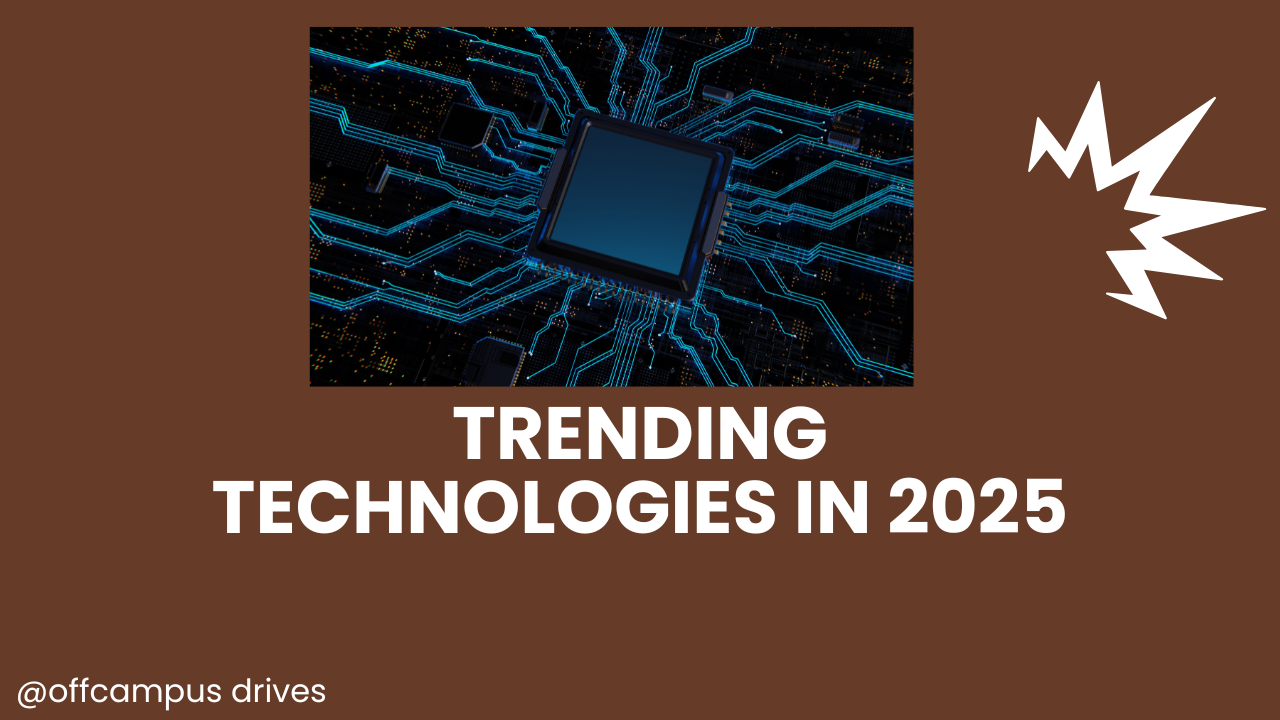Trending Technologies In 2025
In 2025, several emerging technologies are likely to be at the forefront, impacting industries, businesses, and everyday life. Here are some of the most prominent ones:
1. Artificial Intelligence (AI) and Machine Learning (ML)
- Generative AI: AI that can create text, images, music, code, and more. Tools like ChatGPT and DALL·E are evolving rapidly, but in 2025, AI will likely be more sophisticated, with better understanding and interaction capabilities.
- AI-driven automation: More industries will adopt AI to automate complex decision-making, customer service, and even creative processes like writing and design.
- Ethical AI and Governance: With AI becoming more integrated into society, ethical considerations and regulations around its use will play a bigger role.
2. Quantum Computing
- Although still in its early stages, quantum computing has the potential to revolutionize fields like cryptography, material science, and complex problem-solving, solving tasks that are impossible for classical computers.
- Companies like IBM, Google, and startups are pushing quantum computing, and by 2025, we may see more practical applications emerging.
3. 5G and Beyond
- 5G Networks: 5G networks will continue to expand globally, bringing faster, more reliable internet, which will enable the growth of the Internet of Things (IoT), augmented reality (AR), and more.
- 6G Research: While 6G is not yet a reality in 2025, research and development will likely begin in earnest, promising even faster speeds, ultra-low latency, and new applications like real-time holography.
4. Extended Reality (XR)
- Augmented Reality (AR) & Virtual Reality (VR): XR technologies will continue to evolve, providing immersive experiences for gaming, education, healthcare, and enterprise applications. Tools like Meta’s Oculus and Apple’s Vision Pro might become commonplace.
- Mixed Reality (MR): MR will gain traction as a hybrid between AR and VR, allowing real-time interaction with both physical and digital environments, especially in sectors like training, entertainment, and design.
5. Blockchain and Decentralized Finance (DeFi)
- Blockchain technology will move beyond cryptocurrencies to disrupt various industries, including supply chain management, digital identity verification, and secure voting systems.
- NFTs will also evolve beyond just digital art and collectibles, finding use cases in areas like intellectual property rights and real estate.
6. Autonomous Vehicles
- Self-driving cars: Autonomous vehicles will become more sophisticated, with improved safety and efficiency. Electric and autonomous vehicles may become standard for personal transport, logistics, and public transit.
- Delivery Drones: Drones will also become more integrated into delivery services, especially for small packages in urban and suburban areas.
7. Biotechnology and HealthTech
- Gene Editing (CRISPR): Gene editing technologies will advance, offering potential cures for genetic diseases and even enhanced therapies for cancers and aging.
- Wearable Health Tech: Devices that monitor vital signs, track health metrics, and offer real-time diagnostics will become more advanced and mainstream.
- Telemedicine & AI in Healthcare: The integration of AI for diagnostics, treatment planning, and even robotic surgeries will continue to reshape the healthcare sector.
8. Sustainable Technologies
- Clean Energy: Solar, wind, and other renewable energy sources will continue to grow, but by 2025, more breakthroughs in storage and energy efficiency could dramatically reduce costs.
- Carbon Capture and Utilization: Technologies to capture and store carbon dioxide from the atmosphere or use it in commercial applications (e.g., construction materials) will help combat climate change.
- Sustainable Materials: Innovations in bio-based materials and recycling technologies will contribute to a circular economy.
9. Robotics and Automation
- Robotic Process Automation (RPA): Businesses will increasingly automate repetitive tasks across industries using AI-powered robots.
- Collaborative Robots (Cobots): In manufacturing and warehouses, cobots will work alongside human workers, handling dangerous, repetitive, or precise tasks.
- Service Robots: Robots designed for customer service, healthcare, and domestic tasks will become more advanced, with greater emotional intelligence and interaction capabilities.
10. Edge Computing and IoT
- Edge Computing: As devices become more connected, edge computing will be key for processing data closer to where it’s generated, improving speed and reducing latency.
- Smart Cities: With the rise of IoT devices, entire cities will become “smarter,” with connected infrastructure for things like traffic, energy, and waste management.
11. Space Technologies
- Commercial Space Travel: Companies like SpaceX, Blue Origin, and Virgin Galactic are making strides in space tourism, with trips becoming more accessible in the coming years.
- Satellite Internet: Low Earth orbit (LEO) satellites will expand to provide global internet coverage, especially in remote areas.
12. Neurotechnology and Brain-Computer Interfaces (BCIs)
- BCI Devices: Neural interfaces that allow direct communication between the brain and machines will continue advancing, providing new possibilities for people with disabilities and unlocking new ways to interact with technology.
These technologies, while still developing, will significantly impact sectors like healthcare, entertainment, transportation, and more, potentially reshaping economies and societies by 2025 and beyond.
